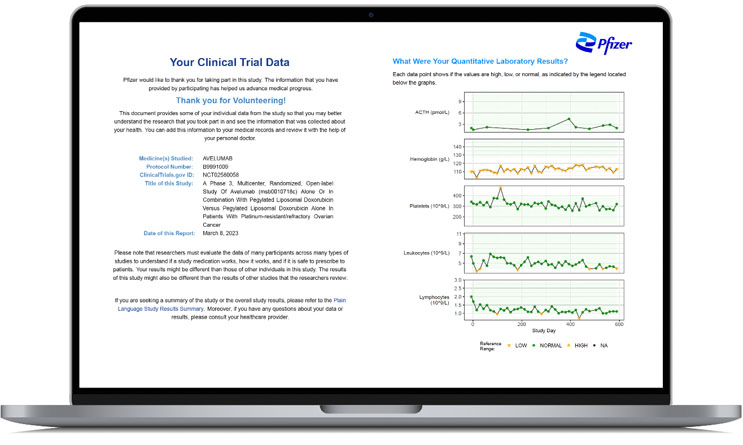Pfizer To Provide Individual Participant Data At Scale
By Aida Habtezion, MD, MSc, FRCPC, AGAF, chief medical officer and head of worldwide medical and safety, Pfizer

The decision to join a clinical trial is personal. Each and every participant plays an important role in medical advancement. Historically, clinical trial sponsors have used participant data to learn more about the safety and efficacy of new treatments. But now, participants can have consistent and reliable access to their individual data.
Pfizer has made a commitment to return individual data to its clinical trials participants through its Participant Data Return initiative.
Participants have long expressed strong interest in the opportunity to access and visualize their data. When empowered with this data, they are more informed about their health, allowing them to make better decisions about their care beyond their trial participation in consultation with their healthcare providers. Research shows that people empowered with this knowledge achieve better health outcomes.1 This is the essence of health information equity: sharing information in a way that is accessible and understandable to all people and allowing everyone to reach their full potential for health.2 We also know that returning individual data to clinical trial participants is foundational to fulfilling our social contract with them.
Returning Data At Scale
Through our Participant Data Return initiative, we are enabling and scaling an end of trial individual participant data return solution that is meaningful and contextualized while simultaneously respecting the scientific integrity of the trial. Pfizer has been building toward this moment for almost a decade, centering the patient from the beginning.
In 2015, Pfizer developed PfizerClinicalTrialAlumni.com to allow participants to securely access, view, and download their aggregate results. In 2018, Pfizer began creating gratitude materials to ensure participants felt seen and to demonstrate our appreciation for their participation. In 2021, we created clinical trial results summaries in plain language and made them publicly available. To make study results more understandable, these summaries are non-technical descriptions of the design and results that include data across the entire study (demographics, symptoms, medical history, etc.).4 This practice helps us improve their trial experience and optimize trial adherence and retention. That same year, in our COVID vaccine trials, we transparently shared our protocol and our data on recruitment and diversity throughout the trial recruitment process.
This brings us to today. In 2023, Pfizer is committing to return individual clinical trial data back to study participants. The Participant Data Return initiative has launched through the Pfizer Clinical Trial Alumni platform, beginning with two target studies and becoming available to all participants in the U.S. in relevant studies from Q4 2023 and onward. Participants at U.S. sites will be able to register on the platform and opt in to receive their data about 12 months following completion of the trial. We are continuing to explore a variety of options to expand this capability globally, in compliance with local regulations.
About twelve months after trial completion, we can now provide data to participants, including patient demographics, treatment arm, adverse events, primary outcome measure, medical history/conditions, procedures, medications, lab results, and vital signs. We will extract data from the relevant clinical trial database for thousands of participants while also preserving their confidentiality and privacy and automatically populate that data into a structured template.

Even more than simply receiving their data, our research demonstrates that how the data is returned is also essential. Participants and healthcare providers (HCPs) prefer to receive visual examples and context.3 Therefore, the data is presented in a visual, easily understood format based upon accepted health literacy principles and market research we conducted to understand participant and provider preferences.
Making Participant Data Return An Industry Standard
Returning individual participant data is another critical step toward improving the trial experience, building trust with participants, and advancing health information equity. Pfizer’s Participant Data Return initiative is part of a larger collaboration with industry partners to share best practices on how to implement and scale a data return solution that meets the needs of participants.
We also have collaborated with the Multi-Regional Clinical Trials (MRCT) Center to contribute to their guidance and toolkit dedicated to returning individual research results to participants. We are also contributing to the IHI (Innovative Health Initiative) FACILITATE project, a patient-centered initiative that aims to develop a new ethical, legal, and regulatory framework overcoming the current limitations and discrepancies between European member states to enable the return of clinical trial data to study participants. We’re also collaborating with TransCelerate’s Participant Data Return project, which will focus on delivering an individual data return resource pack, individual plan, and implementation guide.
Our ultimate aspiration is to ensure that all clinical trial participants, should they choose and where local regulations permit, regardless of their location or the trial they have joined, have access to their individual trial data in a format they can understand and use to ultimately achieve better health outcomes.
We encourage our peers across the industry to join us in this important endeavor to advance health information equity, so that in the future every participant, everywhere may have access to crucial individual health information.
References:
- CDC: Patient Engagement | Health Literacy | CDC
- Berkman: https://doi.org/10.1002/aris.1440370112
- Pfizer: Data Return Exploratory Qual MR Final Readout, Slide 6.
- Pfizer.com. Translating Technical Language into Plain Language for Clinical Trials; 2021. https://www.pfizer.com/news/articles/translating_technical_language_into_plain_language_for
_clinical_trials
About The Author:
 As Chief Medical Officer of Pfizer, Aida Habtezion, M.D., MSc, FRCPC, AGAF leads Pfizer's Worldwide Medical & Safety organization responsible for ensuring that patients, physicians, and regulatory agencies are provided with information on the safe and appropriate use of Pfizer medications and vaccines. She leads Pfizer’s Institute of Translational Equitable Medicine (ITEM), an initiative spanning key research, development, and medical activities to close gaps in health disparity by leveraging science, data, and translational expertise to integrate equity across Pfizer’s end-to-end pipeline. Previously, she was a practicing physician, scientist, and tenured and endowed Professor of Medicine at Stanford University, where she led a large translational research lab focused on understanding disease mechanisms in gastrointestinal diseases. She authored over a hundred high impact publications in top peer-reviewed journals and served in multiple national and international scientific study sections, and editorial boards, and is an elected member of the American Society for Clinical Investigation and the Association of American Physicians.
As Chief Medical Officer of Pfizer, Aida Habtezion, M.D., MSc, FRCPC, AGAF leads Pfizer's Worldwide Medical & Safety organization responsible for ensuring that patients, physicians, and regulatory agencies are provided with information on the safe and appropriate use of Pfizer medications and vaccines. She leads Pfizer’s Institute of Translational Equitable Medicine (ITEM), an initiative spanning key research, development, and medical activities to close gaps in health disparity by leveraging science, data, and translational expertise to integrate equity across Pfizer’s end-to-end pipeline. Previously, she was a practicing physician, scientist, and tenured and endowed Professor of Medicine at Stanford University, where she led a large translational research lab focused on understanding disease mechanisms in gastrointestinal diseases. She authored over a hundred high impact publications in top peer-reviewed journals and served in multiple national and international scientific study sections, and editorial boards, and is an elected member of the American Society for Clinical Investigation and the Association of American Physicians.
